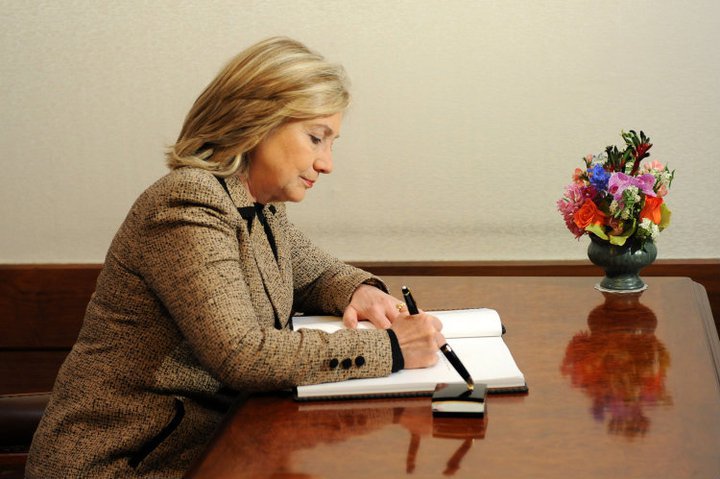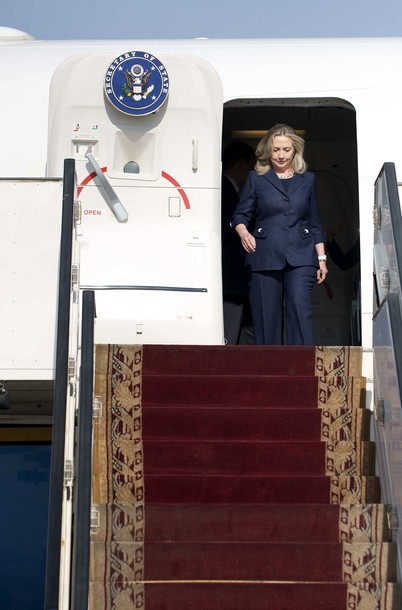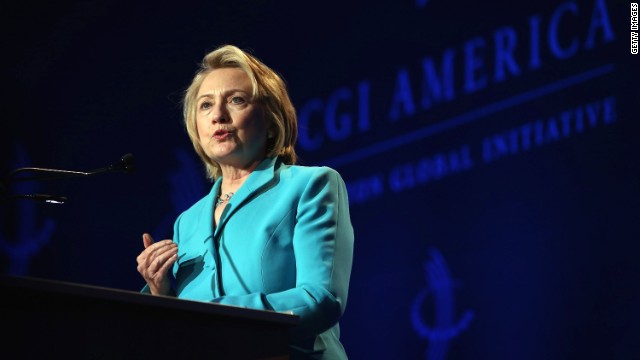Two years ago exactly, the media was hounding her (as always). Then, it was that they wanted her to speak out on Syria. At that time, I posted this retrospective of her efforts to help the Syrian people.
Now might be a good time to review this material while bearing in mind that Hillary is very clear that the response must be international, not unilateral, and not just the US and Europe.
I am posting that response in full here. I know it is long, but if you take the time simply to skim this, you will see that Hillary, back in Spring 2012, predicted what is happening now in Lebanon. If the government does not do its job, you can bet ISIS will step in. Hillary knows this and said it more than three years ago. That is the vision we need in a president.
Hillary Clinton: Hardly Silent on Syria … but Who Listened?
September 3, 2013
Some in the media apparently think it is incumbent upon Hillary Clinton to speak out on Syria despite the fact that she is no longer a government official. As she wraps up her well-deserved vacation and gets back on her schedule of speaking appearances, including the upcoming Clinton Global Initiative, it is perhaps a good time to look back at some of what she said while she served as Secretary of State beginning with this op-ed reposted in full.
Media Note
Office of the SpokespersonWashington, DCJune 17, 2011
In an op-ed in the Asharq Al-Awsat newspaper, Secretary of State Hillary Rodham Clinton condemns the violent crackdown in Syria and calls for a transition to democracy. The full text of the Secretary’s op-ed follows.
“There Is No Going Back in Syria”
By Hillary Clinton
As the violent crackdown in Syria continues, President Assad has shown that he is more interested in his own power than his people.
The world has joined Syrians in mourning the deaths of many innocent people, including a 13-year old boy who was brutally tortured and mutilated. Approximately thirteen hundred Syrians have been killed since protests began. Many thousands more have been jailed and abused. Syrian security forces have surrounded communities and cut off electricity, communications and the Internet. Economic activity has slowed, the country is increasingly isolated and its citizens are growing more frustrated every day.
In his May 19 speech, President Obama echoed demonstrators’ basic and legitimate demands: the Assad government must stop shooting demonstrators, allow peaceful protest, release political prisoners, stop unjust arrests, give access to human rights monitors, and start an inclusive dialogue to advance a democratic transition. President Assad, he said, could either lead that transition or get out of the way.
It is increasingly clear that President Assad has made his choice. But while continued brutality may allow him to delay the change that is underway in Syria, it will not reverse it.
As Syria’s neighbors and the international community respond to this crisis, we should be guided by the answers to several key questions: Why has it erupted? What does the crackdown reveal about President Assad and his regime? And where does Syria go from here?
First, there should be no doubt about the nature of the protests in Syria.
Like Tunisians, Egyptians, Libyans and others across the Middle East and North Africa, the Syrian people are demanding their long-denied universal rights and rejecting a government that rules through fear, squanders their talents through corruption, and denies them the dignity of having a voice in their own future. They are organizing themselves, including the local coordinating committees, and they are refusing to back down even in the face of revolting violence.
If President Assad believes that the protests are the work of foreign instigators – as his government has claimed – he is wrong. It is true that some Syrian soldiers have been killed, and we regret the loss of those lives too. But the vast majority of casualties have been unarmed civilians. By continuing to ban foreign journalists and observers, the regime seeks to hide these facts.
Second, President Assad is showing his true colors by embracing the repressive tactics of his ally Iran and putting Syria onto the path of a pariah state.
By following Iran’s lead, President Assad is placing himself and his regime on the wrong side of history. He will learn that legitimacy flows from the consent of the people and cannot be forged through bullets and billyclubs.
President Assad’s violent crackdown has shattered his claims to be a reformer. For years, he has offered pledges and promises, but all that matters are his actions. A speech, no matter how dutifully applauded by regime apologists, will not change the reality that the Syrian people, despite being told they live in a republic, have never had the opportunity to freely elect their leaders. These citizens want to see a real transition to democracy and a government that honors their universal rights and aspirations.
If President Assad believes he can act with impunity because the international community hopes for his cooperation on other issues, he is wrong about this as well. He and his regime are certainly not indispensable.
A Syria that is unified, pluralistic, and democratic could play a positive and leading role in the region, but under President Assad the country is increasingly becoming a source of instability. The refugees streaming into Turkey and Lebanon, and the tensions being stoked on the Golan, should dispel the notion that the regime is a bulwark of regional stability that must be protected.
Finally, the answer to the most important question of all – what does this mean for Syria’s future? – is increasingly clear: There is no going back.
Syrians have recognized the violence as a sign of weakness from a regime that rules by coercion, not consent. They have overcome their fears and have shaken the foundations of this authoritarian system.
Syria is headed toward a new political order -- and the Syrian people should be the ones to shape it. They should insist on accountability, but resist any temptation to exact revenge or reprisals that might split the country, and instead join together to build a democratic, peaceful and tolerant Syria.
Considering the answers to all these questions, the United States chooses to stand with the Syrian people and their universal rights. We condemn the Assad regime’s disregard for the will of its citizens and Iran’s insidious interference.
The United States has already imposed sanctions on senior Syrian officials, including President Assad. We are carefully targeting leaders of the crackdown, not the Syrian people. We welcomed the decisions by the European Union to impose its own sanctions and by the UN Human Rights Council to launch an investigation into abuses. The United States will continue coordinating closely with our partners in the region and around world to increase pressure on and further isolate the Assad regime.
The Syrian people will not cease their demands for dignity and a future free from intimidation and fear. They deserve a government that respects its people, works to build a more stable and prosperous country, and doesn’t have to rely on repression at home and antagonism abroad to maintain its grip on power. They deserve a nation that is unified, democratic and a force for stability and progress. That would be good for Syria, good for the region and good for the world.
http://aawsat.com/leader.asp?section=3&article=627159&issueno=11890###Below are links to a compendium of her remarks on the deteriorating situation as she met with a variety of action groups on Syria. This is, by no means, a comprehensive collection since she also gave a great many interviews and press briefings following bilaterals over the past two years where she addressed the issues at hand and sought solutions that would permit democracy to take hold.
Hillary Clinton to Human Rights Council: Reject Syria’s Candidacy
April 30, 2011
Secretary Clinton’s Remarks on the Violence in Syria
May 6, 2011
Secretary Clinton’s Statement: Repression in Iran and Syria
June 14, 2011
Secretary Clinton’s Statement on Continuing Violence in Syria
August 1, 2011
Secretary Clinton’s Remarks After Meeting With Syrian Activists
August 2, 2011
Video: Secretary Clinton’s Statement on Syria
August 18, 2011
Hillary Clinton’s Statement on The Human Rights Council’s Special Session on Syria & State Department Update on Libya
August 23, 2011
Hillary Clinton in the D.R. Part II: Remarks at Pathways to Prosperity, on UNESCO, and on Syria
October 7, 2011
Hillary Clinton: Arab League Suspends Syria
November 12, 2011
Secretary Clinton’s Meeting with Syrian National Council
December 6, 2011
Secretary Clinton: Escalation of Regime Violence in Syria
January 30, 2012
Hillary Clinton at Friends of Syria in Tunisia: Remarks and Pictures
February 24, 2012
Hillary Clinton’s Press Availability on Friends of Syria
February 24, 2012
Secretary Clinton’s Remarks Following Meeting with Syrian National Council
April 1, 2012
Secretary Clinton: Intervention to the Friends of the Syrian People
April 2, 2012
Secretary Clinton’s Remarks at the Ad Hoc Ministerial on Syria
April 19, 2012
Syria Violence Could Have Domino Effect In Lebanon, Clinton Warns
May 25, 2012
Clinton Condemns Haoula Massacre in Strongest Possible Terms
May 26, 2012
Video: Secretary Clinton Remarks on Syria
May 31, 2012
Hillary Clinton: Friends of the Syrian People
June 6, 2012
Hillary Clinton: Press Conference Following Syria Action Group Meeting
June 30, 2012
Hillary Clinton at the Friends of the Syrian People Ministerial Meeting
July 6, 2012
Hillary Clinton’s Press Conference Following the Friends of the Syrian People Meeting
July 6, 2012
Hillary Clinton: Saddened and Outraged by Massacre in Traymseh
July 13, 2012
Hillary Clinton on the Resignation of Kofi Annan as Joint Special Envoy for Syria
August 2, 2012
###I must interrupt here to correct a rewrite of history. A few days ago, on CNN, Fouad Ajami said that Hillary Clinton "stopping off to cut a rug" in South Africa on her way to a meeting in Turkey about Syria was bad optics. His story is upside down. Hillary had long been scheduled to stop in South Africa and attend a conference there. Here is her original itinerary which was supposed to be for an 11-day trip - her farewell tour of Africa as Secretary of State.
Hillary Clinton’s Itinerary in Africa
July 30, 2012
Well, the Africa trip is official, and we can see why it took awhile for the State Department to post the itinerary - it's another long one, and arranging it must have been very complex since it does not coincide with earlier reports. More than a week, it's another killer - six countries/11 days. Ghana and Nigeria are not mentioned, but Kenya and South Sudan are. I think I speak for everyone here in wishing her a safe and successful trip and hoping she manages to sneak in a little vacation time when she gets back home.
Secretary of State Hillary Rodham Clinton to Travel to Africa
Press Statement
Victoria Nuland
Department Spokesperson, Office of the SpokespersonWashington, DCJuly 30, 2012
Secretary of State Hillary Rodham Clinton will travel to Africa July 31 through August 10, 2012. During this trip, the Secretary will emphasize U.S. policy commitments outlined in the Presidential Policy Directive - to strengthen democratic institutions, spur economic growth, advance peace and security as well as promote opportunity and development for all citizens
The Secretary’s first stop will be Senegal, where she will meet President Sall and other national leaders and deliver a speech applauding the resilience of Senegal's democratic institutions and highlighting America's approach to partnership.
Next, Secretary Clinton travels to South Sudan where she meets with President Kiir to reaffirm U.S. support and to encourage progress in negotiations with Sudan to reach agreement on issues related to security, oil and citizenship.
In Uganda, the Secretary meets with President Museveni to encourage strengthening of democratic institutions and human rights, while also reinforcing Uganda as a key U.S. partner in promoting regional security, particularly in regard to Somalia and in regional efforts to counter the Lord’s Resistance Army. She will also highlight U.S. support in the fight against HIV/AIDS.
The Secretary will then travel to Kenya where she plans to meet President Kibaki, Prime Minister Odinga, and other government officials to emphasize her support for transparent, credible, nonviolent national elections in 2013. To underscore U.S. support for completing the political transition in Somalia by August 20th, Secretary Clinton will also meet with President Sheikh Sharif and other signatories to the Roadmap to End the Transition.
The Secretary continues her trip in Malawi, visiting President Banda to discuss economic and political governance and reform.
In South Africa, Secretary Clinton will pay her respects to ex-President Mandela, and to participate in the U.S.-South Africa Strategic Dialogue focusing on the partnership between our two countries in addressing issues of mutual concern and our shared challenges on the African and world stage. Secretary Clinton will be accompanied by a U.S. business delegation.###While the trip was in progress, additional stops were scheduled. Many countries wanted Hillary to stop during this tour. Some were added late, e.g. Nigeria, because security issues needed to be resolved and Ghana for the sadly unpredictable funeral of the late John Atta Mills. Turkey was also added because the meeting was scheduled after she was already on tour.
Professor Ajami, we do not appreciate men with white whiskers trying to rewrite history. She did not "stop by" South Africa on her way to Turkey. South Africa was long-scheduled, Turkey was tacked on when the meeting was scheduled. If FM Mashabane wanted to throw a farewell party for her friend and partner with whom she had worked for four years, you, Professor Ajami, should be grateful that someone in our government understood that the next battleground with China is Africa, that the battlefield is economic, and that Hillary Clinton made strong friends there, often while putting herself in grave personal danger. Your smirky, snarky, and untrue comment is shameful, insulting, and disgusting.
###Confirmed: Hillary Clinton’s Africa Itinerary Extended
August 5, 2012
The rumor mill has been whizzing out of control all weekend with stories of additional countries to be added to the already packed schedule for this trip. Originally arranged as an 11-day trip, the addition of Turkey next Saturday for talks on Syria extends that by at least one day. Within the African leg of the trip, Voice of America reports the inclusion of Ghana, Nigeria, and Benin. The first was expected since the purpose is to attend the funeral of Ghana's late President John Atta Mills who passed away unexpectedly on July 24. Sources for that early story appeared credible. The Nigerian leg was announced by local sources last night. Benin comes as a complete surprise since neither very early reports nor the buzzing rumor mill had ever mentioned a stop there. VOA reports:
- U.S Secretary of State Hillary Clinton (R) reacts during here visit to Malawi August 5, 2012. Clinton paid a lightning visit to Malawi on Sunday to congratulate its new president, Joyce Banda, one of only two female heads of state in Africa, for pulling her impoverished country back from the economic brink after a political crisis. REUTERS/Eldson Chagara (MALAWI - Tags: SOCIETY POLITICS)
Clinton is due to fly to South Africa Sunday, and later on to Nigeria, Ghana and Benin.
In Ghana, she is expected to attend the state funeral of the country's late president John Atta Mills.
In Turkey Hillary Clinton Talks No Fly Zones Over Syria
August 11, 2012
Hillary Clinton’s Remarks On Syria With Turkish Foreign Minister Davutoglu
August 11, 2012
Hillary Clinton on the Appointment of Lakhdar Brahimi to Replace Kofi Annan
August 17, 2012
Hillary Clinton at the Ad Hoc Friends of the Syrian People Ministerial
September 28, 2012
Video: Hillary Clinton’s Remarks on Syria
December 4, 2012
###It was during this final trip as Secretary of State that she fell so ill that she fainted and sustained a concussion. Later tests detected a blood clot, and she could not return to her duties until January when she did her best to wrap up her stay at the State Department and put the transition into place for Secretary Kerry's assumption of command.
So for those who would have Hillary Clinton comment at this critical time on a crucial issue, let you be reminded that neither have Bill Clinton nor George W. Bush commented on Syria for excellent reasons. They are no longer in office and do not have access to the latest intel. Neither does Hillary Clinton. The situation is in the hands of the present, second Obama administration. Live with the history you were so instrumental in making.
***********************************************************************
Updated to add: Of course, as soon as I had this all put together, she decided to come out and say something anyway. Then again, what would anyone expect her to say?
(CNN) – Former Secretary of State Hillary Clinton backs President Barack Obama's proposal to take military action in Syria, an aide told CNN's Jessica Yellin on Tuesday."Secretary Clinton supports the President's effort to enlist the Congress in pursuing a strong and targeted response to the Assad regime's horrific use of chemical weapons," the aide said.
Read more >>>>
Actually, CNN got this wrong. She did not back the military action. She backed taking it to Congress.





